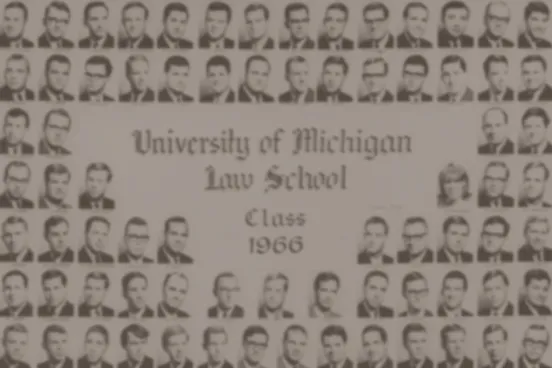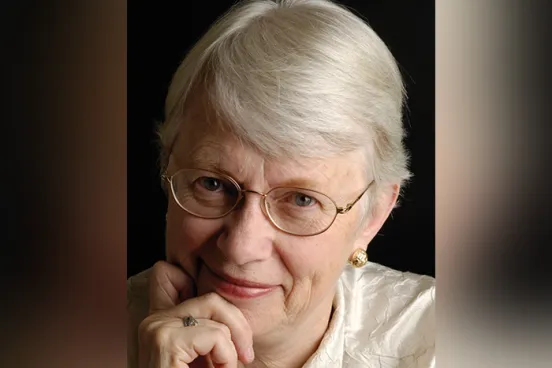
Let’s start with this: Being in the military is hard.
There are tough hours of training. There are repeated, seemingly endless deployments. And yes, there is danger. Then, every two or three years—and sometimes more frequently than that—orders marked “Permanent Change of Station” arrive. That’s when you and your family pack up all your possessions and move across the country or around the world. To wherever your country needs you.
Soldiers, sailors, airmen and women, and Marines all know this. They all signed up for it.
But their spouses didn’t. And while the military life can be hard, so can the lives of military spouses—especially when it comes to their careers.
That’s why efforts like those of Angela Allen, ’07, are so important. Allen, a partner at Jenner & Block LLP, knows firsthand the rigors of life as a military spouse. Her husband joined the Michigan National Guard after the September 11 attacks. Deployment to Iraq quickly followed, with Pvt. Linden Allen working in a transportation unit, crisscrossing a war-ravaged land.
“He was driving all across the country when roadside bombs were one of the biggest problems that our troops faced,” Angela Allen says. She says this without self-pity. Her family has a history of military service; she knows what the job entails.
But she also knows that much of the career difficulty faced by military spouses is a side effect of needlessly restrictive state licensing laws.
For military spouses whose work requires a license—doctors, nurses, teachers, electricians, accountants; altogether, an estimated 35 percent of military spouses—transferring to another state traditionally has meant paying hefty fees to reapply for licensing, taking expensive classes, re-sitting for board exams, and, frequently, waiting. In many cases, by the time spouses became licensed in the new state, it was almost time to move on again.
An Obama administration effort begun in 2011 has improved licensing reciprocity for many military spouses by streamlining laws in all 50 states. But reciprocity is different for lawyers, for whom state bar associations are key.
And that’s where the Military Spouse JD Network (MSJDN) comes in.
Also founded in 2011, MSJDN advocates for licensing accommodations for military spouses, including recognizing existing bar memberships across state lines without additional examination or delay.
When Allen heard about the organization, she had two kids, a husband (by then a captain, serving in the Illinois National Guard), and a Big Law job in Chicago. And even though Guard and Reserve members don’t have to transfer across state lines, she joined MSJDN right away because she knew she could help.
“I kind of felt like I was the only military-spouse lawyer in the world. Then I looked on the MSJDN website, and here is a whole community of military-spouse lawyers,” she says of the group, which now numbers more than 1,000. “I immediately got plugged in.”
In her position at Jenner & Block, Allen was well positioned to lend a hand, and she decided to concentrate her efforts on Illinois.
Jenner & Block consistently is rated a top pro bono firm, and the leadership there had always encouraged her own pro bono efforts, often in support of military families. So she asked around, and one partner suggested she discuss the situation with Jeff Colman, another partner and a member of a commission appointed by the Illinois Supreme Court to improve access to justice. She set up a preliminary meeting with him.
“He said, ‘Oh, yeah, we should definitely try to do this. I have a call with the chief justice in 10 minutes. Why don’t you stay here and explain the situation to him?’” she recalls.
Despite the short preparation time, Allen sat in on the call.
Chief Justice Thomas Kilbride agreed that change was needed and urged her to draft a proposed rule, get the various stakeholders to sign off on it, and submit it to the Access to Justice Commission for its possible recommendation to the Supreme Court.
“Within a week we had drafted a rule protecting the interests of military-spouse lawyers,” Allen says. Then, “in only two months, it was approved by the Access to Justice Commission, the Attorney Registration and Disciplinary Commission, and the Illinois Supreme Court.”
Allen deflects credit to Jenner & Block, whose support and legal connections made the prompt change possible. She’s pleased with MSJDN’s progress, though: When she joined the group, only four states and territories had approved special reciprocity rules for lawyers with military spouses; now that number has swelled to 19. The addition to that list of a state with as much legal horsepower as Illinois may help prod other state bars to grant more flexibility to military spouses, Allen hopes.
Efforts are under way for a military spouse rule accommodation in Michigan. (If you would like to assist MSJDN’s efforts, contact your Michigan state representative.)
“It’s a retention tool for the military,” Allen says. “If we can ease the burden for other spouses who might have career goals, it’s not as tough a decision for the servicemember to stay in. And it’s helping our military spouses, who serve their country too.”
Learn more about MSJDN at www.msjdn.org.







